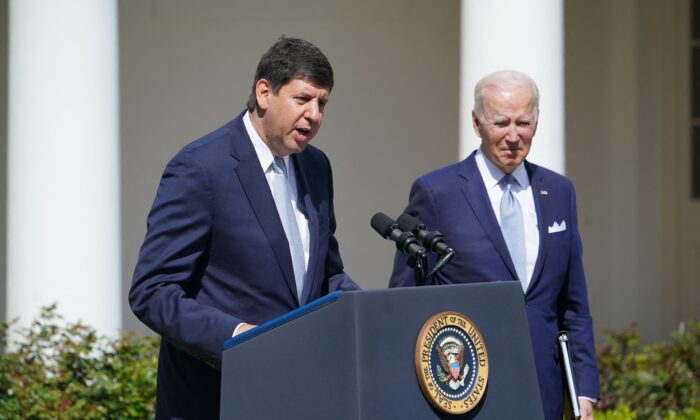By Joseph Lord
The Senate Judiciary Committee on May 25 met to consider the nomination of Steven Dettelbach to be director of the Bureau of Alcohol, Firearms, and Tobacco (ATF), leading to a tense exchange between Dettelbach and Sen. Tom Cotton (R-Ark.) over the definition of an “assault weapon.”
The meeting comes in the wake of a school shooting in Ulvada, Texas, that left at least 19 dead, sparking renewed cries among Democrats for stricter federal gun control legislation.
In its 50-year history, the ATF has had recurring difficulties in getting Senate confirmation for appointed directors, with only one nominee—B. Todd Jones, appointed by President Barack Obama—ever being confirmed by the Senate.
In September 2021, President Joe Biden was forced to withdraw the nomination of his first pick for ATF director—David Chipman—after Chipman proved too controversial even for some Democrats. In the absence of a Senate-confirmed ATF head, the agency has for decades been run by non-confirmed acting directors.
“I vow, if I’m given the privilege of serving as director, to partner with others to advance the cause of public safety, and to approach that task—especially here and now—with an open heart, with open ears, and with an open mind,” Dettelbach concluded his opening remarks.
Reviving a common GOP line of questioning for would-be gun regulators, Sen. Cotton during his questioning of Dettelbach asked for a definition of the word “assault weapon,” a catch-all term often used by gun control advocates but which many have difficulty defining.
Citing a 2018 campaign Dettelbach mounted to become attorney general of Ohio, Cotton noted “you called for a ban on ‘assault weapons.’ What is an ‘assault weapon,’ could you define it for me?”
“Senator, when I was a candidate for office I did talk about restrictions on assault weapons, I did not define the term and I haven’t gone through the process of defining that term,” Dettelbach admitted.
He continued, “That would only be for the Congress—if it chose to take that up—to do, and if you chose to take it up, I would be at the ATF and there’s perhaps expertise or data we could give you so you could make the appropriate decision to both protect the public and protect the Second Amendment.”
“So you’re running for public office and you called for a ban on assault weapons but you don’t have a definition for assault weapons?” Cotton asked.
“Senator, it would only be for a legislative body—whether it was the Ohio legislature or the Congress—it would only be for a legislative body to do that work, and I acknowledge that that would be a difficult task to define assault weapons because, on the one hand, you don’t want it to be so narrow that it doesn’t offer the protections that are intended, and on the other hand you don’t want it to be so broad that it infringes unnecessarily on the rights of citizens,” Dettelbach responded.
“I acknowledge that that’s a difficult task but it would be for this body to do, not for me,” he added.
“Why is it so hard to define assault weapons?” Cotton asked.
“Well, I think senator, it’s what I told you which—it’s you don’t want to be so narrow as to be meaningless and you don’t want to be so broad as to infringe on the rights of law-abiding Americans unnecessarily,” Dettelbach responded.
Pushing further, Cotton argued that while various types of firearms exist—ranging from pistols to shotguns to rifles—there is no category clearly defined as an “assault weapon.”
“Can you go into a federally-licensed firearm dealer and find a category of weapons on the wall labeled as ‘assault weapons?’” Cotton asked.
“I don’t believe that’s a category of weapons that’s labeled on the wall of retailers—it’s not necessarily what retailers call it that would affect the decision of a legislative body but, no, in answer to your question,” Dettelbach responded.
“It’s what politicians and lawyers in Washington call it,” Cotton retorted.
During the hearing, several Democrats took the opportunity to push for stricter gun control laws in the wake of the Texas shooting.
“You come here at a moment of extraordinary anguish, anxiety, and anger in this country,” Sen. Richard Blumenthal (D-Conn.) told Dettelbach. “And I believe that we must move forward with gun violence prevention reforms that make our laws more effective and give you more tools you need in saving communities and individuals.”
“I believe in the Second Amendment,” Blumenthal insisted. “It’s the law of the land. There are measures we can take that are consistent with the Second Amendment that will separate people from firearms if they are dangerous to themselves or others—red flag statutes, background checks, safe storage … ghost gun bans, and others.”
Blumenthal called for the Senate “to seize this moment of extraordinary challenge … to make sure you have a mandate from the United States Congress to do your job.”
“We’re the only civilized nation on earth that watches our citizens, our children, get gunned down and does nothing to prevent it from happening again,” said Senate president pro tempore Patrick Leahy (D-Vt.) in an impassioned statement.
“We’re cowards if we don’t act, cowards!” Leahy added.
Sen. Jon Tester (D-Mont.), against many in his party, rejected efforts to tie the ATF nomination to the Texas shooting.
“I don’t think the shooting in Texas has anything to do with the ATF nominee,” Tester told reporters.
Some Republicans, by contrast, attributed the Texas shooting and other shooting to causes beyond the availability of firearms.
“For far too long [we’ve] failed to look back at the root causes of rampage violence,” Sen. Mike Lee (R-Utah) said.
“Questions involving things like ‘Why is our culture suddenly producing so many young men who wanna murder innocent people?’ It raises questions like, could things like fatherlessness, isolation from families, the breakdown of civil society or the glorification of violence be contributing factors?
“But instead the left once again is calling for more gun control. They wanna crack down on law abiding Americans and federal firearms licensees who wanna follow the law instead of armed criminals.”
Lee also blasted gun control groups like the Brady Campaign for “[wasting] no time in trying to profit off of this tragedy,” noting that immediately following news of the shooting several gun control groups sent out emails asking for donations to “play off of [peoples’] emotions” about the shooting.
Despite his party’s calls for a doomed test vote on a gun control bill to show where Republicans stand, Senate Majority Leader Chuck Schumer (D-N.Y.) said in a May 25 statement that there would be no such vote. Instead, Schumer called for Americans to vote Democrat in November for more wide-reaching gun control legislation.
To be confirmed, Dettelbach will need to prove more popular with several moderate Democrats than Biden’s previous nominee.
In September, controversy surrounding Chipman fractured the Democratic unity needed for a confirmation. Sens. Joe Manchin (D-W. Va.), along with moderate Sens. Angus King (I-Maine) and Jon Tester (D-Mont.) signaled strong skepticism toward the nominee.
It remains unclear whether these moderates will feel more confident in Dettelbach. Because the Senate is evenly-divided, a single defection would cause Dettelbach’s nomination to fail, leaving the ATF without a Senate-confirmed director.






